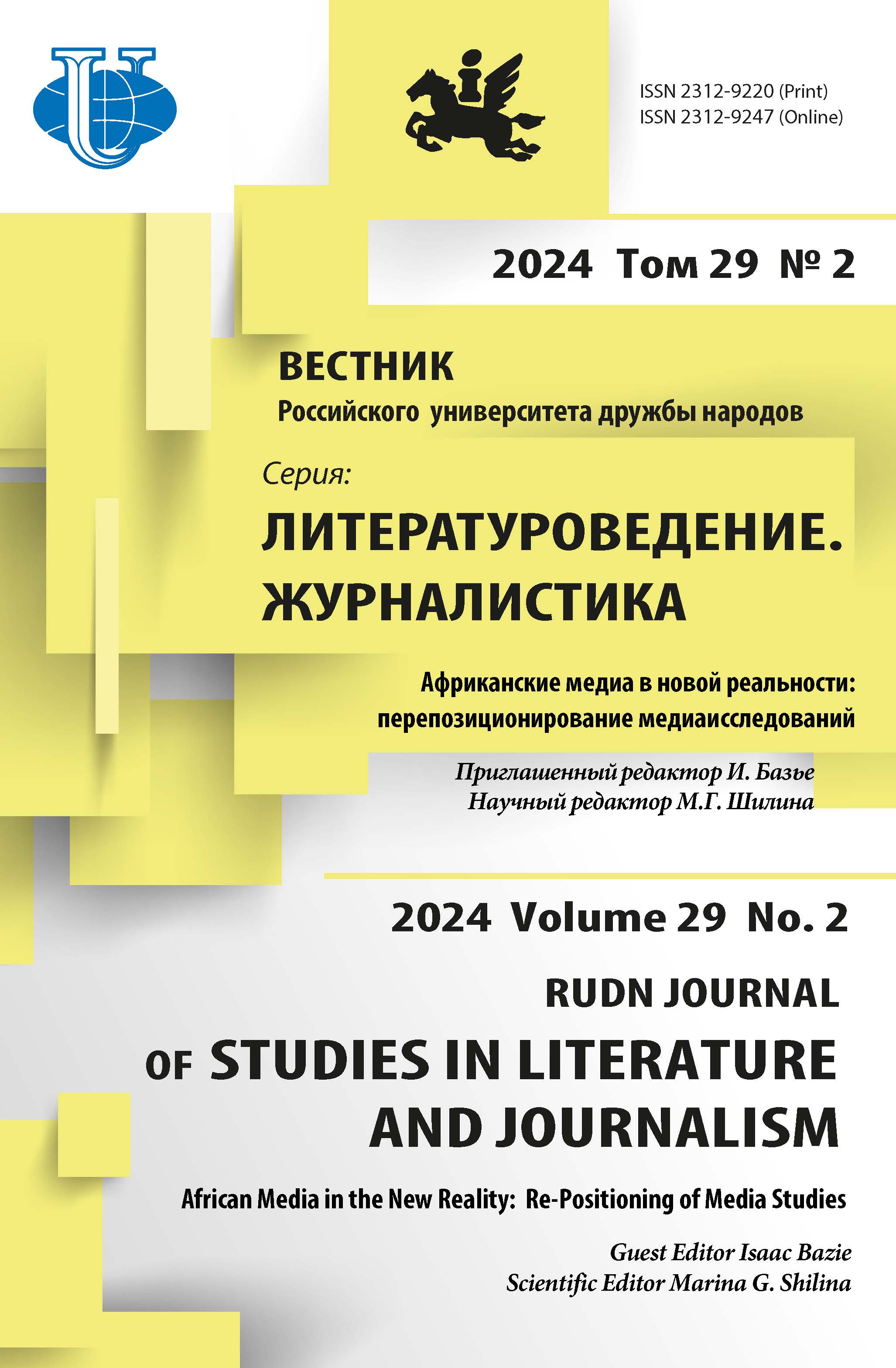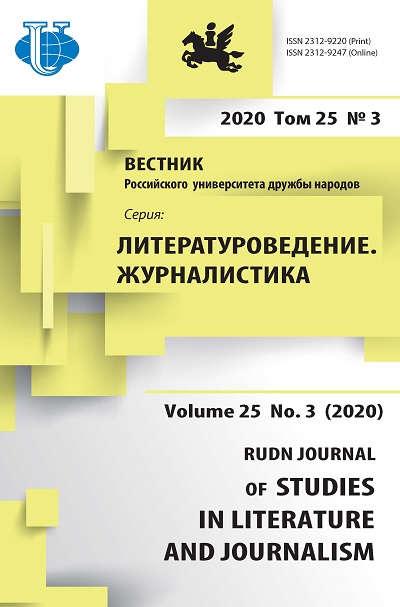Specific of artistic world modeling in the Russian symbolism fiction: theory, trends, transpersonal models
- Authors: Garipova G.T.1
-
Affiliations:
- Vladimir State University named after Alexander and Nikolay Stoletovs
- Issue: Vol 25, No 3 (2020)
- Pages: 399-423
- Section: LITERARY CRITICISM
- URL: https://journals.rudn.ru/literary-criticism/article/view/24818
- DOI: https://doi.org/10.22363/2312-9220-2020-25-3-399-423
Cite item
Full Text
Abstract
The article is devoted to the study of the peculiar properties of artistic world modeling in the Russian symbolism fiction with an emphasis on the anthropological and ontological concepts of Man and Being, structuring the “world-like” novel model. The ability to identify the evolutionary dynamics of both the aesthetic and ethical-philosophical paradigm of the modernist type of artistic consciousness, identified in the context of existentialization and neo-mythologization trends, determines the relevance of the research problem. The novelty of this research is in the analysis of the author's transpersonal models of myth in Russian modernist novels at the beginning of 20th century, in terms of knowledge of the “aesthetic imperative of integrity” integrating text consciousness (the world as a text), personal consciousness (I-being) and ontological consciousness (being-in-me). Mythological-cultural concepts of Christological philosophy of D. Merezhkovsky, the semiosphere of V. Bryusov’s novel “The Fiery Angel”, mythological codes of the anti-utopian novel-myth L. Andreev, reflecting the most important categories and attitudes of the transpersonal anthropological and religious-philosophical concepts of the “new religious consciousness” of Russian symbolism became the object of this study.
About the authors
Gulchira T. Garipova
Vladimir State University named after Alexander and Nikolay Stoletovs
Author for correspondence.
Email: ggaripova2017@yandex.ru
Doctor of Philosophy (in Philology) (PhD), Associate Professor of the Department of Russian and Foreign Philology
1 Nikitskaya St, Vladimir, 600000, Russian FederationReferences
- Khalizev, V.E. (1999). Teoriya literatury [Theory of literature]. Moscow, Vysshaya shkola Publ.
- Epshteyn, M. (1988). Paradoksy novizny. O literaturnom razvitii ХIХ–ХХ vekov [Paradoxes of novelty. About the literary development of the 19th–20th centuries]. Moscow.
- Shneyder, V. (2017). Smysl teksta. Nekotoryye filosofskiye prilozheniya semantiki vozmozhnykh mirov [Meaning of the text. Some philosophical applications of the semantics of possible worlds]. Moscow, Ekaterinburg, Kabinetnyi uchenyi Publ.
- Freydenberg, O.M. (1998). Mif i literatura drevnosti [Myth and literature of antiquity]. Moscow, Vostochnaya literatura RAN.
- Khrestomatiya po istorii filosofii (zapadnaya filosofiya) [Reader’s book concerning history of philosophy (Western philosophy)]: Textbook for universities (part 2). (2001). Moscow, VLADOS Publ.
- Rudnev, V.P. (1997). Slovar’ kul’tury ХХ veka. Klyuchevyye ponyatiya i teksty [Dictionary of culture of the XX century. Key concepts and texts]. Moscow, Agraf Publ.
- Ivanov, V. (1988). Borozdy i mezhi: Opyty esteticheskiye i kriticheskiye [Furrows and boundaries: Aesthetic and critical experiments]. Poeticheskiye techeniya v russkoy literature kontsa ХIX – nachala ХХ veka [Poetic trends in Russian literature of the late XIX – early XX century]: Chrestomathy (p. 69). Moscow, Vysshaya shkola Publ.
- Kolobayeva, L.A. (2000). Russkiy simvolizm [Russian symbolism]. Moscow, Moscow University Publishing House.
- Sovremennaya zapadnaya filosofiya [Modern Western philosophy]: Dictionary. (1991). Moscow, Izdatelstvo politicheskoy literatury Publ.
- Berdyayev, N. (n.d.). Russkaya ideya. Osnovnyye problemy russkoy mysli XIX veka i nachala XX veka [Russian idea. The main problems of Russian thought of the 19th century and the beginning of the 20th century]. Retrieved April 11, 2020, from http://philologos. narod.ru/berdyaev/berd-rusidea.htm
- Bely, A. (1994). Simvolism kak miroponimaniye [Symbolism as world understanding]. Moscow, Respublika Publ.
- Zamanskaja, V.V. (2002). Jekzistencialnaja tradicija v russkoj literature ХХ veka: Dialogi na granicah stoletij [Existential tradition in Russian literature of the 20th century: Dialogues on the borders of centuries]. Moscow, Flinta Publ., Nauka Publ.
- Kamanina, E.V. (2002). Filosofsko-esteticheskiy aspekt literaturnogo soznaniya XX veka [Philosophical-aesthetic aspect of the literary consciousness of the 20th century]. Vestnik moskovskogo universiteta. Seriya 9. Filologiya [Herald of Moscow University. Series 9. Philology], (5), 149–151.
- Merezhkovskiy, D.S. (1991). V tikhom omute. Stat’i i issledovaniya raznykh let [In a quiet pool. Articles and research from different years]. Moscow.
- Volkogonova, O. (n.d.). Religioznyy anarkhizm D. Merezhkovskogo [Religious anarchism of D. Merezhkovsky]. Retrieved April 20, 2020, from http://www.philosophy.ru/library/ volk/merez/html
- Berdyaev, N.A. (1989). Filosofiya svobody. Smysl tvorchestva [Philosophy of freedom. The meaning of creativity]. Moscow, Pravda Publ.
















